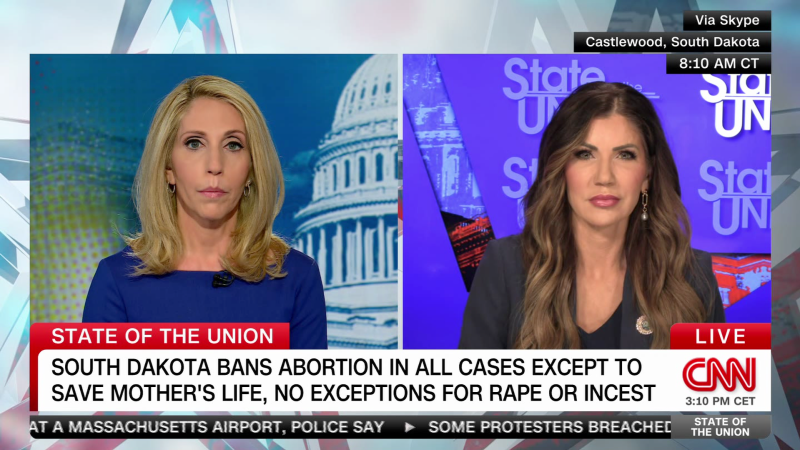After the passing of a near-total abortion ban in South Dakota, Governor Kristi Noem faced tough questions from CNN’s Dana Bash regarding the lack of exceptions for rape and incest. Noem defended the ban, stating that she did not believe one tragedy should perpetuate another tragedy. This controversial stance has sparked debate among pro-choice advocates who argue that women should have the right to make decisions about their own bodies in cases of rape or incest. Noem’s unwavering defense of the ban highlights the deep divide between the pro-life and pro-choice camps in the ongoing debate over abortion rights in the United States.
Despite pressure from Bash and other critics, Governor Noem remained steadfast in her support of the no-exceptions abortion ban in South Dakota. She argued that every life is precious and should be protected, regardless of the circumstances surrounding its conception. This uncompromising stance has drawn praise from anti-abortion groups, who see the ban as a step in the right direction towards protecting the rights of the unborn. However, it has also drawn condemnation from pro-choice advocates, who view the lack of exceptions for rape and incest as a violation of women’s rights and autonomy over their own bodies.
The issue of abortion exceptions for cases of rape and incest is a deeply contentious one that has divided the nation for decades. While some believe that all life is sacred and should be protected at all costs, others argue that women should have the right to make decisions about their own bodies, especially in cases of extreme trauma such as rape or incest. Noem’s defense of the ban reflects the ongoing struggle between these two viewpoints, highlighting the complex moral and ethical considerations at play in the abortion debate.
As the debate over abortion rights continues to intensify, Governor Noem’s unwavering stance on the no-exceptions abortion ban in South Dakota has become a focal point for both sides of the issue. Pro-life advocates applaud her commitment to protecting the rights of the unborn, while pro-choice advocates criticize her lack of compassion for women who have been victims of rape or incest. The controversy surrounding the ban underscores the deep-seated emotions and beliefs that underlie the abortion debate, making it clear that finding common ground on this issue will be a challenging task in the years to come.
Despite facing criticism and pushback from pro-choice advocates, Governor Noem remains resolute in her defense of the no-exceptions abortion ban in South Dakota. She continues to argue that every life is worth protecting, regardless of the circumstances surrounding its conception. While her stance may be unpopular with some, it reflects a deeply held belief in the sanctity of life and the importance of upholding moral and ethical standards in the face of difficult decisions. Whether her position will ultimately stand the test of time remains to be seen, but for now, Governor Noem remains committed to supporting the ban and standing by her convictions on the issue of abortion rights.
In the midst of a heated national debate over abortion rights, Governor Kristi Noem’s defense of the no-exceptions abortion ban in South Dakota has ignited strong emotions and heightened tensions on both sides of the issue. The lack of exceptions for cases of rape and incest has drawn criticism from pro-choice advocates, who argue that women should have the right to make decisions about their own bodies in cases of extreme trauma. However, Governor Noem’s unwavering commitment to protecting the rights of the unborn has also garnered support from anti-abortion groups, who see the ban as a crucial step towards advancing their cause. As the debate rages on, it is clear that the issue of abortion rights will continue to be a source of contention and disagreement in American society for the foreseeable future.


